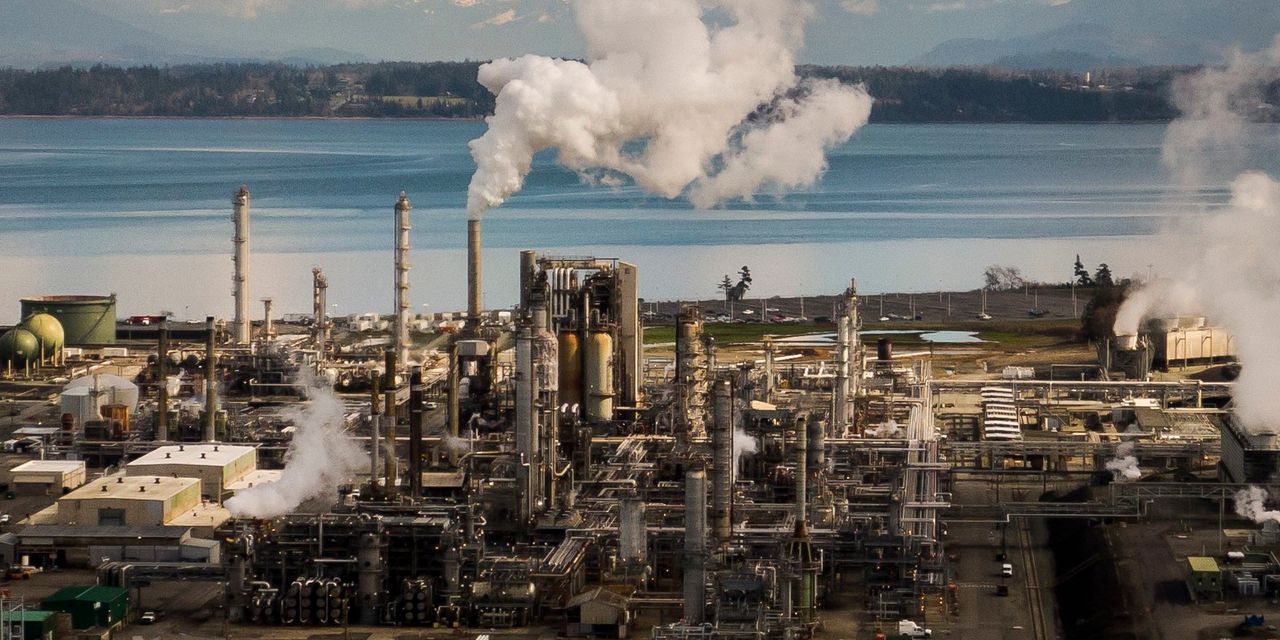U.S. oil futures climbed back above $90 a barrel to settle modestly higher on Tuesday as investors shook off worries about the global economic outlook to resume a rally that’s been fueled by tightening crude supplies.
Price action
-
West Texas Intermediate crude for November delivery
CL00,
+3.73% CL.1,
+3.73% CLX23,
+3.73%
rose 71 cents, or 0.8%, to settle at $90.39 a barrel on the New York Mercantile Exchange. -
November Brent crude
BRNX23,
+0.16% ,
the global benchmark, advanced 67 cents, or 0.7%, to finish at $93.96 a barrel on ICE Futures Europe. -
October gasoline
RBV23,
+1.47%
gained 1 cent, or 0.7%, to end at $2.5622 a gallon, while October heating oil
HOV23,
+2.92%
was off 3 cents, or 1.2%, to settle at $3.2238. -
October natural gas
NGV23,
+4.33%
rose 1 cent, or 0.6%, to end at $2.6560 per million British thermal units.
Market drivers
U.S. crude settled above $90 a barrel after dipping back below that threshold on Monday.
“It looks like nothing is going to get in the way of this oil price rally,” said Edward Moya, senior market analyst at OANDA, in emailed comments on Tuesday. “Energy traders know a bullish trend when they see one and it will take a lot more than a strong dollar, softer Russian ban, and weakening demand, to disrupt this rally.”
“Oil prices are in backwardation and probably will stay that way a while longer,” he added.
See: Oil prices at $90 a barrel unlikely to derail the U.S. economy or consumer spending, Goldman Sachs says
Oil prices hit 2023 highs earlier this month after Saudi Arabia said it would continue a production cut of 1 million barrels a day through the end of the year and Russia said it would also move to curb exports by 300,000 barrels a day.
Expectations for a significant supply deficit moving into year-end alongside growing optimism over the potential for an economic soft landing as major central banks slowed or ended rate increases were cited for gains.
However, uncertainty around the demand outlook has risen after the Federal Reserve last week indicated rates may continue to move higher and will remain elevated for longer than investors previously anticipated.
Meanwhile, the ICE U.S. dollar index
DXY
on Tuesday jumped to its highest level since November 2022 as rising Treasury yields have kept the greenback well supported against its major peers.
The yield on the 10-year Treasury
BX:TMUBMUSD10Y
rose 1.7 basis points to 4.558% on Tuesday, the highest level since Oct. 16, 2007, according to Dow Jones Market Data. The yield on the 2-year Treasury
BX:TMUBMUSD02Y
remained unchanged, at 5.129% on Tuesday.
See: Oil could hit $150, sending ‘shock through system,’ says top shale CEO
Higher oil prices are also attracting added supply, Robert Yawger, executive director for energy futures at Mizuho, said in a note.
The Energy Information Administration’s domestic production estimate is up 700,000 barrels a day since the end of May to 12.9 million barrels a day, shy of the record of 13.1 million barrels a day in March 2020, he noted, while 400,000 barrels a day of Iraqi Kurd barrels sent through the Turkish export facility at Ceyhan are expected to return to the market soon.
“Iranian barrels may come out of the shadows and return to the open market after diplomatic inroads. Plus, new barrels from Suriname, and Guyana, continue to hit the market,” he said.
The American Petroleum Institute will report U.S. commercial inventories of crude oil later on Tuesday. The Energy Information Administration will release official inventory figures on Wednesday morning, while natural-gas inventory data is due Thursday.
Read the full article here







